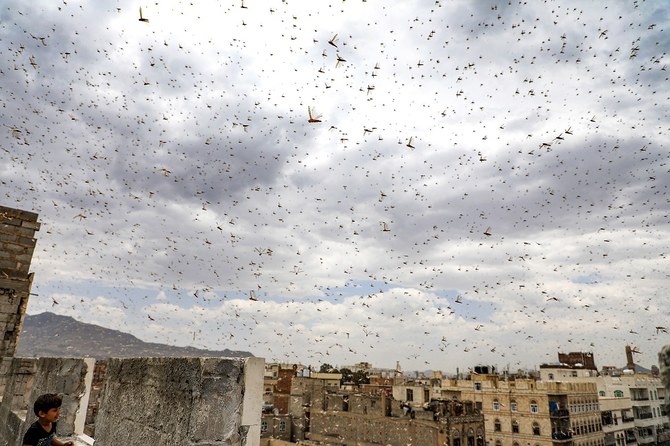NEW YORK: A ravenous pest is threatening the livelihood of millions of people in the Middle East and Africa — but the menace did not appear overnight. In fact it has been slowly building for three years.
Locusts breed in remote areas and thrive in damp conditions. Moisture is critical if their eggs are to survive and hatch, and it also feeds the fresh, green vegetation they need for food and shelter.
In early 2018, the insects found the perfect breeding ground in the Empty Quarter of the Arabian Peninsula. It is a part of the desert that is difficult to access, with “sand dunes as tall as Manhattan skyscrapers.”
There are no roads, no villages and no means of communication, so the normal steps to monitor and contain growing swarms of locusts could not be taken. Then the weather intervened to make matters worse.
It is extremely rare for two cyclones to bring storms to the area in the same year, but that is exactly what happened. In October 2018, just as the sand in the Empty Quarter had started to dry out after the first storm, a second brought more rain. As a result, the swarm of locusts began to grow out of control.
“That allowed for three generations of breeding: an 8,000-fold increase in locust numbers over a very short period of nine months,” said Keith Cressman, senior locust forecasting officer at the UN’s Food and Agricultural Organization (FAO). For the past 33 years he has been operating a desert locust monitoring and early-warning system.
“It was like Club Med,” he added. “The locusts were completely on holiday.”
When the vegetation that had sprouted thanks to all the rain, on which the locusts had been feeding during breeding, was stripped bare, the insects began to migrate. The first swarm headed across the Persian Gulf into Iran, Pakistan, India and Southwest Asia. A second went in the opposite direction, toward Yemen.
In summer 2019, the locusts hopped across the Red Sea and the Gulf of Aden to Somalia and Ethiopia where they plagued the Horn of Africa, aided by widespread seasonal rains that again provided the perfect conditions for intensive breeding.
The FAO carried out control operations that it said saved 2.7 million tons of cereal crops, enough to feed 18 million people for a year in countries that are already reeling from poverty and food insecurity.
Last month, however, Cyclone Gati brought flooding to northern Somalia, which created the conditions for infestations to spread further in the coming months. The FAO has warned that new swarms are already forming and threatening to return to northern Kenya. Breeding is also taking place on both sides of the Red Sea, posing renewed threats to Eritrea, Saudi Arabia, the Sudan and Yemen.
Farmers in Saudi Arabia and Sudan are well aware of the danger from desert locusts, which represent the greatest pest threat to agriculture in those countries. Both have well-established national programs to keep infestation under control.
However farmers in Kenya, for example, have not seen a plague of locusts for 70 years. They have only heard horror stories about such a thing from their grandparents. These farmers lack resources for irrigation and so they grow their crops on the edge of the desert — which means they will be the first to lose their crops when swarms of locusts emerge from the heart of the desert.
Farmers sometimes mistake an approaching swarm of locusts for a rainstorm, only to see their crops destroyed in a matter of hours.
“In a good year, those crops represent your entire livelihood for your family — not only for that year, but often for the next several years to come,” said Cressman. “It’s a bumper crop: you’re getting an extra harvest for the lean years. So, in half a day that swarm has wiped out your entire livelihood. That is a scary kind of thought.”
Yemen had an efficient national monitoring and control program that helped to prevent such agricultural disasters, but it has collapsed since the war began in the country. Cressman said that conflict means locust experts “can’t get into those areas anymore. It’s just not safe. You’re not going to risk your life for the locusts.”
He added: “Yemen is the key country here: it has become a reservoir of desert locusts since those first two cyclones.”
It has been raining continually in Yemen, causing floods in parts of the country where rain is not usually so common.
“The locusts are professional survivalists and they’ve just been opportunistically taking advantage of that,” said Cressman.
The FAO has appealed for funding of $40 million to increase surveillance and control efforts in the coming year in the worst-affected countries — including Sudan, Yemen, Ethiopia, Kenya and Somalia — and to provide aid for farmers who have lost their livelihoods.
The organization said more than 35 million people are already acutely food insecure in those countries. It estimated that number could increase by 3.5 million if nothing is done to control the latest swarm.
The threat posed by the desert locusts follows three consecutive years of droughts followed by months of floods, along with the challenges created by the COVID-19 pandemic.
“It’s one shock after another,” said Cressman. “It’s just a piling up of additional shocks in a very fragile kind of region.
“If we don’t get the money, control operations risk being halted or severely reduced. We don’t want that to happen because locust swarms are coming in now prior to the next growing season and so they will increase. That will have very severe consequences for crop production and food security.”













